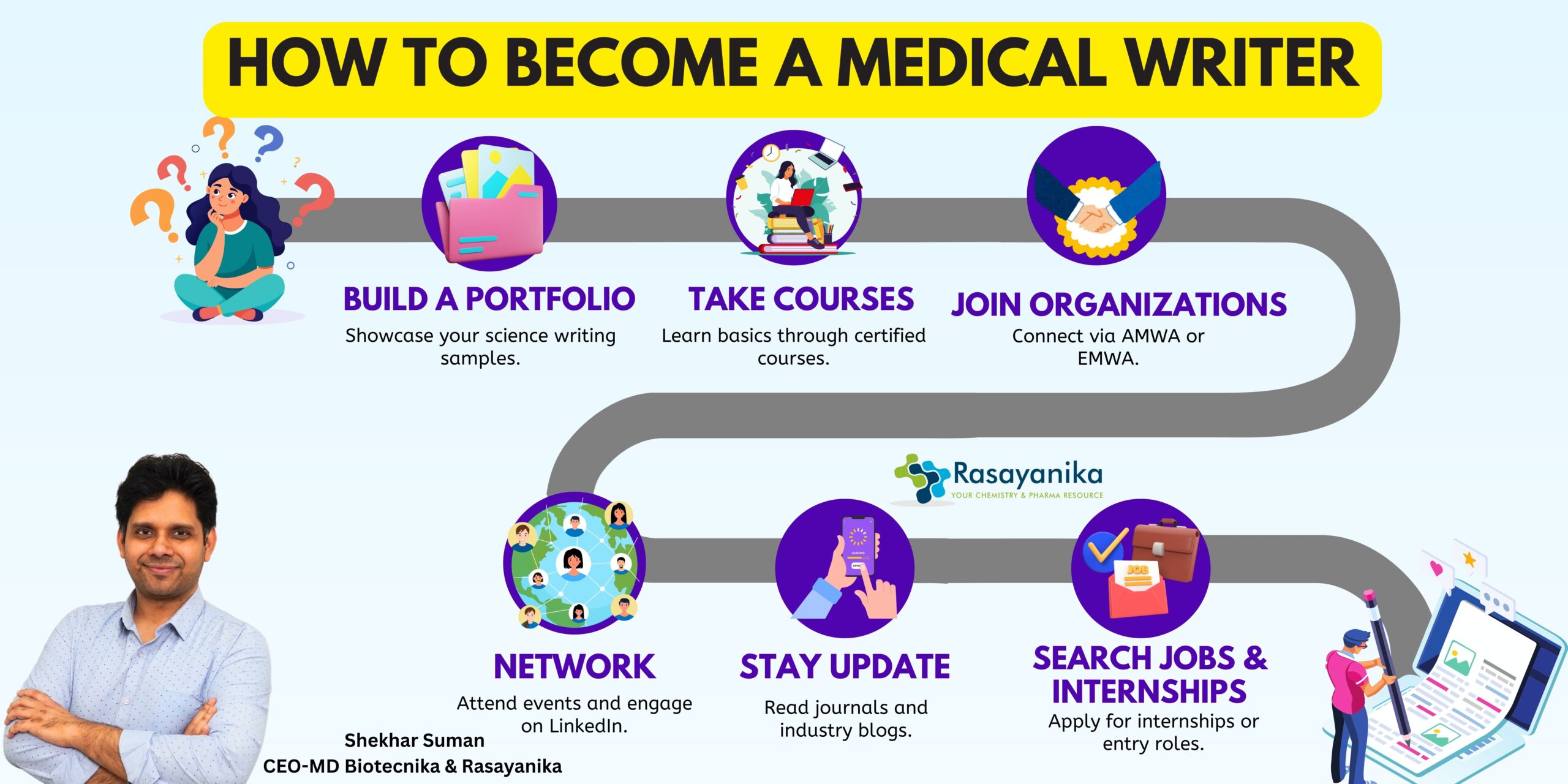Medical Writing for Chemists: Turning Science into Stories
Do you have the ability to explain the complex chemical reactions in an easy way? If you have ever found yourself explaining the complex chemistry concepts to your peers, or even your curious family. Do you enjoy this challenge? Today, scientific communication is more critical than ever, and chemists are uniquely equipped to translate intricate data into clear, meaningful stories. That’s where medical writing comes in.
Medical writing is not just about scribbling words on paper. It’s all about making science more accessible, accurate, and impactful. For chemists, it offers a fresh perspective on using their scientific background outside the lab, in a role where their expertise still matters deeply. Whether crafting regulatory documents, authoring educational material, or helping launch a new drug, medical writing can be a powerful and rewarding extension of your chemistry career.
This article examines the scope of medical writing, the suitability of chemists for this role, the essential skills they must develop, and the diverse career paths available in this rapidly evolving profession.
What is Medical Writing?
Let’s get started by understanding what medical writing is all about. It’s a collaboration of art and science to create clear and well-structured documents that explain medical and scientific information. These can range from reports for doctors and regulators to easy-to-read content for patients. The primary goal is to share accurate and useful health-related knowledge related to drugs, devices, therapies, and scientific findings.
The field is typically divided into the following categories:
- Regulatory Writing:
It involves preparing documents required for regulatory submissions to health authorities. These documents can be clinical study protocols, investigator brochures, clinical study reports, and common technical documents (CTDs). You can work with the FDA (U.S. Food and Drug Administration) and the EMA (European Medicines Agency).
- Scientific Publications:
The writers work on manuscripts for peer-reviewed journals, conferences, abstracts, posters, and presentations. The documents can be used to share the research findings with the scientific community.
- Promotional and Marketing Content:
This primarily involves creating brochures, websites, training materials, and other marketing assets. The writers must ensure that claims are supported by evidence and adhere to ethical guidelines.
- Educational Materials:
These materials are used to educate both healthcare professionals and patients. Examples include continuing medical education (CME) modules, patient information leaflets, and disease awareness content.
- Health Journalism and Public Communication:
Medical writers also write content for magazines, newspapers, blogs, and other media platforms. They aim to create awareness and make scientific information available to everyone.
Each of these categories is different from one another, yet all of them demand a strong scientific knowledge and writing skills.
Why Chemists Make Great Medical Writers
Now that you have understood medical writing, let’s dive into why a chemist is a great medical writer. Well, chemists naturally have a wide range of skills and qualities that lead them towards a successful career in medical writing. Let’s list out some of these:
- Scientific Expertise:
Chemists understand chemical reactions, how drugs are metabolized in the body, their safety, and the process of developing new drugs. This knowledge is very useful in medical writing, especially in the pharmaceutical industry.
- Analytical Thinking:
Trained chemists can analyse complex data, identify patterns, and draw conclusions. With an analytical mind, skilled chemists can review clinical trial results. They can evaluate the efficacy of new drugs.
- Attention to Detail:
Chemists have good observation skills, as they pay keen interest to protocols and results. This habit of attention to detail is an essential criterion for writing, as accuracy is the key.
- Familiarity with Scientific Terminology:
It is seen that most chemists find navigating technical language easy. This can help them to communicate with scientific professionals effectively.
- Experience with Research: Many chemists have experience in academic or industrial research, including designing experiments, analyzing data, and writing reports. These experiences are directly transferable to medical writing tasks.
Often, chemists-turned-medical writers find these skills of great value. These skills help them survive the competitive writing world. They bring scientific credibility and insights that enhance the quality of documents they write.
Skills Chemists Need to Develop
Chemists have a strong scientific foundation, so they need to develop some specific skills to enter the medical writing field. These skills will help them succeed in this new role and bridge the gap between being a subject matter expert and an effective communicator.
- Writing Skills:
Writing for medical or scientific audiences requires clarity, coherence, and correct grammar. Academic writing can be dense and complex, whereas medical writing has to be straightforward, with no extra drama. This will help the audience understand the topic better.
- Storytelling Ability:
A good medical writer goes beyond stating facts. It’s about engaging the readers with a compelling story. The writer has to hook the reader while describing the new drug or narrating the patient’s journey, also highlighting the importance of data.
- Audience Awareness:
Different documents are for various audiences. The writer has to understand the audience before writing. For example, a clinical study report requires a formal and technical tone as it is for regulators. Whereas, a patient educational leaflet must have a simple language and a reassuring tone. Writers must modify their approach according to the audience.
- Regulatory Knowledge:
Aspiring medical writers must understand FDA or EMA guidelines and requirements. This plays a vital role while writing about drug development. Also, one must be familiar with ICH (International Council for Harmonisation) guidelines, as they play an important role in the regulatory system.
- Software Proficiency:
The professional medical writer uses specific software tools for reference management, document formatting, and statistical data analysis. A strong knowledge of Microsoft Word, EndNote, and Adobe Acrobat is a must, along with proficiency in statistical software or content management systems.
- Time Management and Organization:
Medical writing projects have tight deadlines and require coordination. One needs to collaborate with multiple stakeholders. High-end project management and organizational skills are necessary.
- Ethical Considerations:
Writers have to maintain integrity by accurately presenting information. They must avoid plagiarism or misrepresentation. One should understand the ethical guidelines of medical publishing.
You can develop these skills through formal training, self-study, or on-the-job learning. The aspiring medical writers should commit to continuous learning and professional growth.
Common Medical Writing Projects for Chemists
Let us now understand the types of projects chemists work on. This will help us to interpret the transition into medical writing:
- Clinical Study Reports (CSRs):
These reports focus on how a clinical trial was conducted and what was found. Chemists in regulatory roles often write CSRs for drug approvals.
- Investigator Brochures:
These documents give an overview of a drug’s lab and clinical data for researchers running trials. Chemists skilled in drug action and metabolism are well-suited for this.
- Scientific Manuscripts and Abstracts:
Chemists help turn lab results into articles for scientific journals. They assist with writing, editing, and formatting for publication.
- Literature Reviews:
Writers research and summarize published studies on a topic. Chemists often do this during early drug development or to create training materials.
- Regulatory Dossiers:
These are formal documents needed for drug approval, often following the CTD format. Chemists typically write the quality and non-clinical sections.
- Patient Leaflets:
A patient leaflet explains complex drug information in simple language. Chemists who have become medical writers ensure the science is correct and easy to understand.
- CME Materials:
CME or Continuing Medical Education educates doctors about new treatments in the medical world. As a medical writer with a chemistry background, you can write slides, summaries, and examples that can be used in medical training.
These projects will give you a wide range of opportunities. You can apply your scientific knowledge to convert complex concepts into easy-to-understand ones with your writing skills.
Career Paths and Opportunities
With medical writing, one can have diverse and impactful career options based on interests, personalities, and lifestyles. Whether you want to work in a structured environment or a flexible freelancing one, there are multiple opportunities for everyone. Here is the list:
- In-House Medical Writer:
Several pharmaceutical companies, contract research organizations (CROs), and medical communication agencies hire full-time medical writers. As an In-House Medical Writer, you will collaborate with many functional teams and work on various documents.
- Freelance Medical Writer:
Medical writing offers you the golden opportunity to work at your own pace. As a freelancer, you will have the flexibility to work on your terms for projects, clients, and working hours. You can work from journal articles to marketing brochures.
- Regulatory Writer:
They are experts in the documentation requirements for drug approval. They must pay close attention to detail and be knowledgeable of international regulatory guidelines.
- Publication Writer:
Publication writers work on manuscripts, abstracts, posters, and presentations for academic and industrial research. They aim to communicate scientific findings clearly and concisely while maintaining ethical standards.
- Medical Communications Specialist:
These writers focus on content for marketing, sales, and public relations. They work closely with branding teams and must balance scientific accuracy with persuasive communication.
- Medical Journalist or Science Communicator:
Writers in this field produce content for newspapers, magazines, blogs, or media outlets. They aim to make science accessible to a broader audience and often cover the latest research and health trends.
Career progression in medical writing can lead to senior roles such as lead writer, content strategist, medical writing manager, or director of scientific communications.
How to Get Started?
The easiest yet difficult question is how to start your journey. Remember, a career in medical writing is more than just writing. To get started, you need a strong writing portfolio, relevant experience, and connections.
- Build a Portfolio:
The first and most crucial part of your success journey as a medical writer is building a portfolio. Start by showcasing samples of your creative writing. By highlighting your work, you are giving an idea of your ability to explain scientific topics. You can do it with blog posts, short articles, or mock regulatory documents. Take up writing assignments online or offline.
- Take Courses:
In the technological era, several courses for medical writing are available, both online and in person. These courses will strengthen your basics of medical writing. You can consider certifications from the American Medical Writers Association (AMWA), European Medical Writers Association (EMWA), or other institutions.
- Join Professional Associations:
Enroll yourself in organizations such as AMWA and EMWA. These professional associations will give you access to resources, job boards, mentorship, and networking opportunities.
- Network:
The magic mantra for any profession is to build a network. The same goes here. Attend conferences, webinars, and workshops. Connect with professionals in the field through social media platforms like LinkedIn.
- Stay in the Loop:
Reading has always been a great tool. You can stay updated with the latest trends by reading medical journals, regulatory updates, and industry blogs. This will give you the gist of medical writing.
- Look for Internships or Entry-Level Roles:
Search for junior medical writing roles or internships. This will help you to gain hands-on experience. These roles will structure your future with skill development and mentorship.
Medical writing is about building a connection between science and people. As a chemist, you know the language of molecules, mechanisms, and methods. All you have to do is share the scientific stories that inform, persuade, and inspire. Remember, you are not leaving your science behind. You are just talking about it differently. With the right mindset and skills, you are all set to become a voice that helps shape the future of healthcare. After all, who better to write the future of medicine than someone who understands its building blocks?

















































